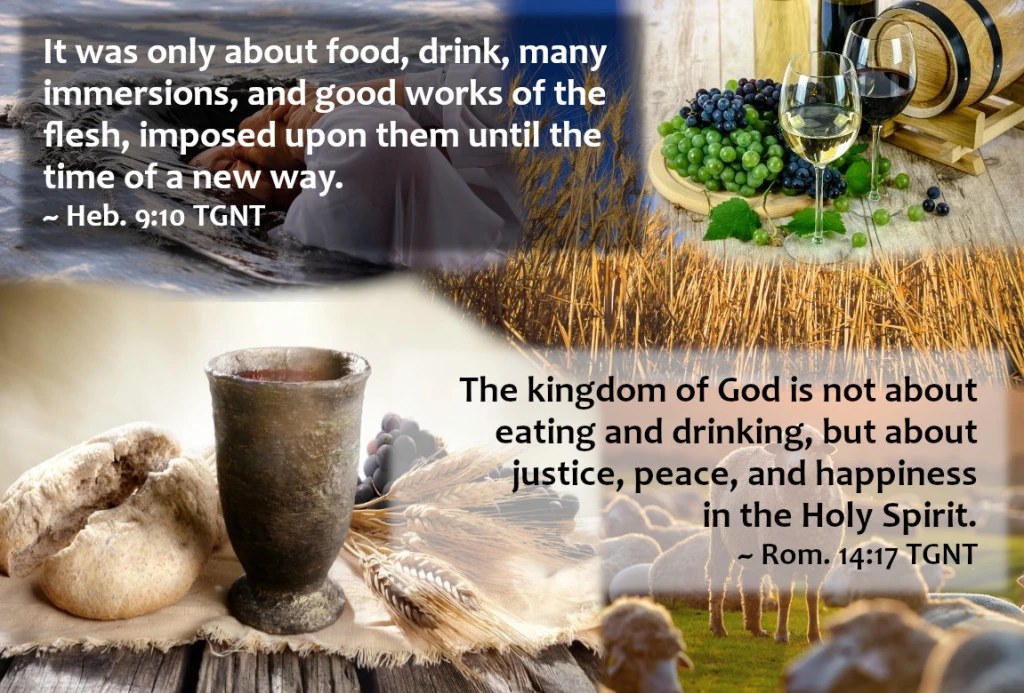Ordinances
Must Christians practice water baptism? Must we observe the Lord's Supper? Tradition says one thing, and scripture says another.

An ordinance is an authoritative command or order, a custom or practice established by long usage, or a Christian rite. There are two traditional ordinances in Christian history: the Lord's Supper and water baptism. But if these two practices are truly commands from God rather than mere traditions, they must be specified in the Bible for the Body of Christ, and there must be stated penalties for failure to perform them. Let's examine the scriptures.
The Lord's Supper
This event is described in Mat. 26:26-28, Mark 14:22-24, Luke 22:14-20, 1 Cor. 10:16, and 1 Cor. 11:20-34. Jesus said that it was to be a memorial, but he left the details up to us; no specific year, day, or time, no presiding official, no instructions on how to conduct it or even what to eat or drink beyond bread and wine.
The only requirement is mentioned by Paul in 1 Cor. 11:27: that we don't practice it "in an unworthy manner". Paul is referring to the Corinthian believers' cheapening of the Lord's Supper from a memorial to gluttony and drunkenness, soiling the church's reputation and insulting the poor. Many try instead to interpret it to mean we as individuals can't be harboring any sin for which we've failed to repent. Granted, self-reflection is always good, but that isn't what the Lord's Supper is about. Our focus should be on Jesus, not us.
Regarding the bread and cup specifically, the point again is to remember Jesus' sacrifice on our behalf. It's not about making sure we eat bread and drink wine. Jesus clearly stated their symbolic purpose. For this reason, and since Jesus had not yet made the sacrifice and was sitting there intact, no one can defend the claim that these elements literally became his flesh and blood.
Regarding the washing of feet, as some denominations practice it, the point was our attitude toward other believers. It was culturally the job of the lowest household servant, yet as Jesus explained at that time, whoever would be the greatest must be the least (Luke 22:24-27). Context is everything, and part of it is understanding that cultural norms change. Today we would do better to remind Christian leaders to be humble.
The habit or tradition of the earliest believers was to “break bread” in each other's homes, which was a figure of speech for sharing meals. We have a description of a particular memorial meal in 1 Cor. 11, but the only difference seems to be that the people celebrated some meals as the memorials.
Water Baptism
Baptisms (not only of water!) are mentioned in Mat. 3:11, Acts 2:41, Acts 8:38, Acts 10:48, Acts 11:16, 1 Cor. 1:14-17, Heb. 11:29, and 1 Peter 3:20-21. Yes, in various places it shows people getting water baptized upon their profession of faith, but there's no command for all Christians for all time to perform it, nor a penalty for not performing it. In fact, the point in some of those passages was to not get into the water, and our baptism is by fire instead of water. Why was Paul glad he hadn't baptized many people, if it were an act of obedience?
Baptism was in the law of Moses, and many other nations practiced it, both for religions and secular offices, as a public proclamation. If literally washing feet is seen as cultural, so also should water baptism be seen as cultural. Since there are no commands for either, nor penalties for failure to perform either, then neither is required.
Conclusion
Ordinances cannot save us, or make us more spiritually mature, or give us better standing in the Body of Christ. Failure to practice them should never be grounds for disfellowship or for otherwise shaming any believer. Let them be what scripture teaches them to be: memorials and proclamations.

